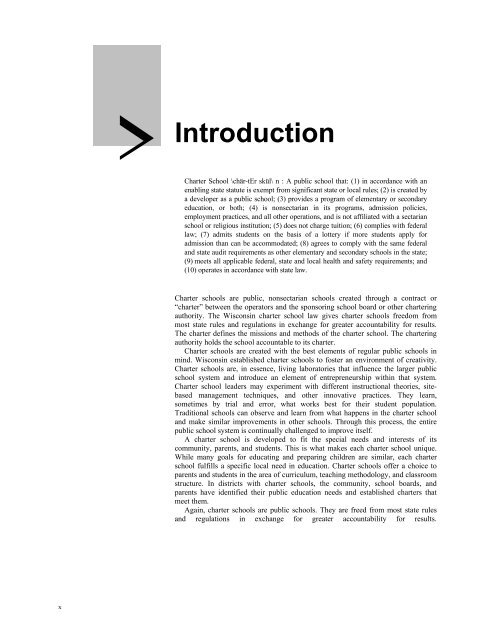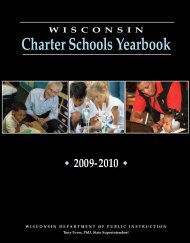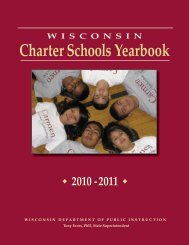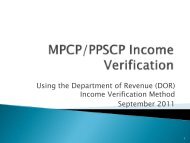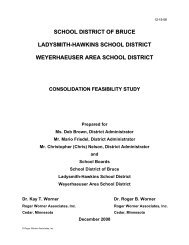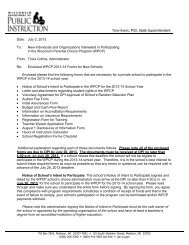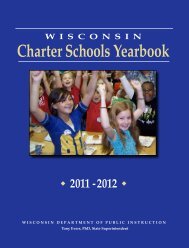Wisconsin Charter Schools Yearbook - School Management Services
Wisconsin Charter Schools Yearbook - School Management Services
Wisconsin Charter Schools Yearbook - School Management Services
Create successful ePaper yourself
Turn your PDF publications into a flip-book with our unique Google optimized e-Paper software.
x<br />
><br />
Introduction<br />
<strong>Charter</strong> <strong>School</strong> \chär-tEr skül\ n : A public school that: (1) in accordance with an<br />
enabling state statute is exempt from significant state or local rules; (2) is created by<br />
a developer as a public school; (3) provides a program of elementary or secondary<br />
education, or both; (4) is nonsectarian in its programs, admission policies,<br />
employment practices, and all other operations, and is not affiliated with a sectarian<br />
school or religious institution; (5) does not charge tuition; (6) complies with federal<br />
law; (7) admits students on the basis of a lottery if more students apply for<br />
admission than can be accommodated; (8) agrees to comply with the same federal<br />
and state audit requirements as other elementary and secondary schools in the state;<br />
(9) meets all applicable federal, state and local health and safety requirements; and<br />
(10) operates in accordance with state law.<br />
<strong>Charter</strong> schools are public, nonsectarian schools created through a contract or<br />
“charter” between the operators and the sponsoring school board or other chartering<br />
authority. The <strong>Wisconsin</strong> charter school law gives charter schools freedom from<br />
most state rules and regulations in exchange for greater accountability for results.<br />
The charter defines the missions and methods of the charter school. The chartering<br />
authority holds the school accountable to its charter.<br />
<strong>Charter</strong> schools are created with the best elements of regular public schools in<br />
mind. <strong>Wisconsin</strong> established charter schools to foster an environment of creativity.<br />
<strong>Charter</strong> schools are, in essence, living laboratories that influence the larger public<br />
school system and introduce an element of entrepreneurship within that system.<br />
<strong>Charter</strong> school leaders may experiment with different instructional theories, sitebased<br />
management techniques, and other innovative practices. They learn,<br />
sometimes by trial and error, what works best for their student population.<br />
Traditional schools can observe and learn from what happens in the charter school<br />
and make similar improvements in other schools. Through this process, the entire<br />
public school system is continually challenged to improve itself.<br />
A charter school is developed to fit the special needs and interests of its<br />
community, parents, and students. This is what makes each charter school unique.<br />
While many goals for educating and preparing children are similar, each charter<br />
school fulfills a specific local need in education. <strong>Charter</strong> schools offer a choice to<br />
parents and students in the area of curriculum, teaching methodology, and classroom<br />
structure. In districts with charter schools, the community, school boards, and<br />
parents have identified their public education needs and established charters that<br />
meet them.<br />
Again, charter schools are public schools. They are freed from most state rules<br />
and regulations in exchange for greater accountability for results.


